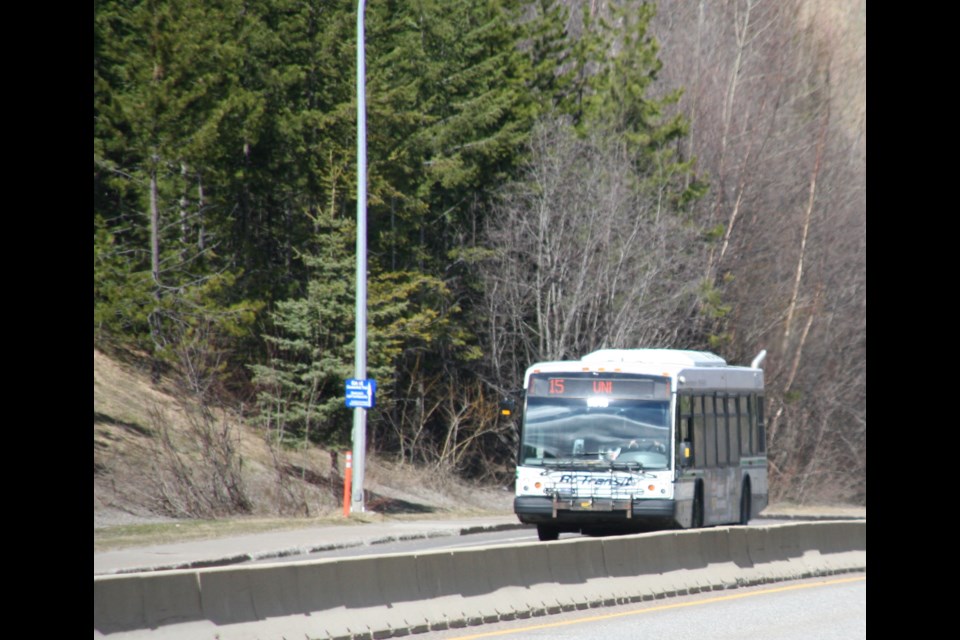Prince George city council unanimously passed the first three readings of a bylaw renewing its annual operating agreement with BC Transit at its Monday, May 26 meeting.
Each year, the city must renew its annual operating agreement for BC Transit to operate both conventional and accessible bus service in alignment with the provincial government’s fiscal year.
Prince George Transit is funded by both the City of Prince George and BC Transit, with Pacific Western Transportation operating local transit services.
For the 2025-26 fiscal year, Prince George’s conventional service is expected to see operating costs worth almost $13.2 million while the accessible service has estimated expenses worth almost $1.9 million.
Once the provincial government’s share of costs and revenues from fares and advertising are removed from the equation, Prince George is expected to have around $4.9 million in net costs for the conventional service and $626,621 for the accessible service.
Those are increases from the approximately $4.6 million and $528,421 net costs for the city for each service seen in the 2024-25 fiscal year.
At the meeting, city staff and BC Transit manager of government relations Elise Wren presented statistics showing that while ridership increased considerably for both conventional and accessible services from lows caused by the COVID-19 pandemic in the 2019-20 fiscal year, it had yet to reach the same levels from before the pandemic by the 2023-24.
That decrease and subsequent recovery was seen by all transit services in the province. The 2024-25 statistics will be available in June, she said.
She said the provincial government provides more than 60 per cent of Prince George’s transit funding for both conventional and accessible service.
Last year, BC Transit introduced the Umo contactless payment system to Prince George, which allows riders to pay with a smartphone app or reloadable cards.
While the rollout was smooth overall, Wren said there was some feedback about the difficulty of purchasing physical cards that they’ve tried to address. On-bus debit and credit payments are expected to come to local buses later this year.
This fiscal year, she said, BC Transit is looking to improve services on routes 5, 15, 88 and 89 during weekday evenings. Across the whole province, Wren said there was an unprecedented number of requests for transit funding increases.
Routes 88 and 89, which travel from College Heights to the Hart, are the busiest in the city at present.
Prince George’s request for funding on these routes was accepted due to strong ridership figures.
Wren said that the federal government has established a public transit fund with $3 billion a year in funding available starting in the 2026-27 fiscal year.
Prince George is getting some funding from the baseline funding stream on this program, Wren said, which will provide almost $7 million over the next decade to help with the cost of bus replacement and infrastructure upgrades.
Over the next three years, the organization is looking to complete a transit exchange study, an operations and maintenance facility study, investigate the feasibility of service to Prince George International Airport and industrial areas and improve service frequency between the Spruceland exchange and the Westgate exchange.
Wren also looked at limitations facing local transit in upcoming years. She said keeping services affordable, acquiring new buses, keeping services affordable and ambitious infrastructure projects will all be challenges.
Coun. Tim Bennett said he appreciated new bus shelters that had been installed across the city earlier in the year. He said he’d heard frustrations from parents that ticketing and fare apps do not allow multiple members of a family to pay for fares at once.
Unfortunately, the app only lets one person at a time pay for fares, Wren said, but she hoped that the introduction of debit and credit services would help with this. Cash is always an option too, she added.
Coun. Trudy Klassen asked how safety concerns are addressed. Wren said BC Transit reviews complaints and concerns every morning and forwards them to the appropriate people to address.
Coun. Garth Frizzell expressed hope that funding from higher levels of government for transit would continue to increase. With other BC communities like Victoria getting electric buses, he asked whether
Wren said the battery-powered electric buses are still in training mode and have yet to operate in Victoria. Phase two of the electric rollout will extend to other communities in the Kootenays, but the north has yet to be added to the list.
She said there are concerns over battery longevity and performance in cold weather that need to be explored.
After seeing Ontario get a lot of transit funding from the federal government in recent years, Coun. Susan Scott said she was glad that communities in BC like Prince George are finally receiving a share.
Coun. Cori Ramsay said she hoped ridership levels would continue to climb towards pre-pandemic levels.
In the past, Ramsay said most people paid for transit rides with cash or prepaid tickets. With people loading fare money onto the Umo app, she wondered what happened to those funds before they’re officially spent on a bus.
Wren said her organization talks a lot about keeping money collected by Umo in the cities they’re spent in. She said when people buy monthly or semester passes, that money goes directly towards the city.
However, fare funds stored on the app act like a gift card only go towards municipalities when they’re spent. If someone from Prince George went to Bulkley-Nechako, those funds could still be spent but would go to the other transit system.
Coun. Ron Polillo said he was glad to see consideration of expanding services to the airport and industrial area, saying it’s one of the most frequent pieces of feedback he receives on local transit including one note on the subject earlier that day.
Council voted unanimously to pass first three readings of the bylaw.


